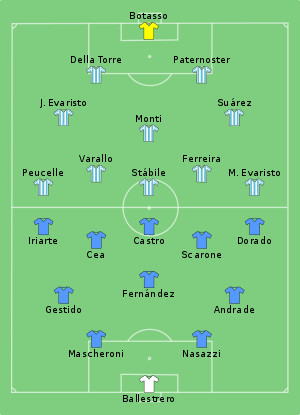1930 FIFA World Cup Final
The 1930 FIFA World Cup Final was a football match contested by Uruguay and Argentina to determine the champion of the 1930 FIFA World Cup. The final was a rematch of the gold medal match of the 1928 Olympics, which Uruguay won after a replay.
 Uruguay's fourth goal was scored by striker Héctor Castro. | |||||||
| Event | 1930 FIFA World Cup | ||||||
|---|---|---|---|---|---|---|---|
| |||||||
| Date | 30 July 1930 | ||||||
| Venue | Estadio Centenario, Montevideo | ||||||
| Referee | John Langenus (Belgium) | ||||||
| Attendance | 68,346 | ||||||
The final was played at the Estadio Centenario in Montevideo, Uruguay, on 30 July, a Wednesday. Up to date, it is, along with the 1966 FIFA World Cup Final, the only World Cup Final not to be played on a Sunday (the latter being played on a Saturday). This World Cup Final is also the only one not to be played on a weekend. The stadium gates were opened at eight o'clock, six hours before kick-off, and at noon the ground was full,[1] officially holding 93,000 people.[2] A disagreement overshadowed the build-up to the match as the teams disagreed on who should provide the match ball, forcing FIFA to intervene and decree that the Argentine team would provide the ball for the first half and the Uruguayans would provide one for the second.[3] The game ended 4–2 to Uruguay after they trailed 2–1 at half-time, adding the title of World Cup winners to their status as Olympic champions. Aged 31, Uruguayan manager Alberto Suppici is the youngest coach to ever win the FIFA World Cup. Jules Rimet, president of FIFA, presented the Uruguayan team with the World Cup Trophy, which was later named after him. The following day was declared a national holiday in Uruguay;[2] in the Argentinian capital Buenos Aires, a mob threw stones at the Uruguayan consulate.[4]
The last living player from that final, Francisco Varallo (who played as a striker for Argentina), died on 30 August 2010 at the age of 100.[5] At the other hand, the last survivor of the winning team, Ernesto Mascheroni, died on 3 July 1984 at the age of 76.
Route to the final
| Uruguay | Round | Argentina | |||||||||||||||||||||||||||||||||||||||||||||||||||||||||||||||||||||||||||||||||||
|---|---|---|---|---|---|---|---|---|---|---|---|---|---|---|---|---|---|---|---|---|---|---|---|---|---|---|---|---|---|---|---|---|---|---|---|---|---|---|---|---|---|---|---|---|---|---|---|---|---|---|---|---|---|---|---|---|---|---|---|---|---|---|---|---|---|---|---|---|---|---|---|---|---|---|---|---|---|---|---|---|---|---|---|---|---|
| Opponent | Result | First round | Opponent | Result | |||||||||||||||||||||||||||||||||||||||||||||||||||||||||||||||||||||||||||||||||
| 1–0 | Match 1 | 1–0 | |||||||||||||||||||||||||||||||||||||||||||||||||||||||||||||||||||||||||||||||||||
| 4–0 | Match 2 | 6–3 | |||||||||||||||||||||||||||||||||||||||||||||||||||||||||||||||||||||||||||||||||||
| Match 3 | 3–1 | ||||||||||||||||||||||||||||||||||||||||||||||||||||||||||||||||||||||||||||||||||||
|
Final standing |
| |||||||||||||||||||||||||||||||||||||||||||||||||||||||||||||||||||||||||||||||||||
| Opponent | Result | Knockout stage | Opponent | Result | |||||||||||||||||||||||||||||||||||||||||||||||||||||||||||||||||||||||||||||||||
| 6–1 | Semi-finals | 6–1 | |||||||||||||||||||||||||||||||||||||||||||||||||||||||||||||||||||||||||||||||||||
Match
Summary
After 12 minutes, Pablo Dorado put the hosts into the lead, before Argentine winger Carlos Peucelle equalised 8 minutes later, beating goalkeeper Enrique Ballestrero with a powerful shot. In the 37th minute, tournament top scorer Guillermo Stábile gave Argentina a 2–1 lead going into the break. Uruguay leveled the score 12 minutes into the second half via a goal from Pedro Cea, before Santos Iriarte restored the lead for the hosts in the 68th minute. With a minute left, Héctor Castro put Uruguay up 4–2, sealing the victory for Uruguay in the inaugural World Cup.[6]
Details
Uruguay
|
Argentina
|
|
 |
| ||||||||||||||||||||||||||||||||||||||||||||||||||||||||||||||
|
Assistant referees:
|
Match rules
|
See also
References
- Glanville, p19
- "FIFA World Cup Origin" (PDF). FIFA.com. Fédération Internationale de Football Association. Archived from the original (PDF) on 29 November 2007. Retrieved 20 May 2007.
- "Uruguay 1930". BBC Sport. British Broadcasting Corporation. 11 April 2002. Retrieved 25 February 2007.
- Glanville, p21
- "Francisco Varallo, 100 not out". FIFA.com. Fédération Internationale de Football Association. Retrieved 20 June 2014.
- Molinaro, John F. (26 November 2009). "1930 World Cup: Uruguay welcomes the soccer world". CBC Sports. Canadian Broadcasting Corporation. Retrieved 8 April 2018.
- This is one of several goals for which the statistical details are disputed. The goalscorers and timings used here are those of FIFA, the official record. Some other sources, such as RSSSF, state a different scorer and/or timing. See "World Cup 1930 finals". RSSSF. Archived from the original on 3 December 2008. Retrieved 1 December 2008..